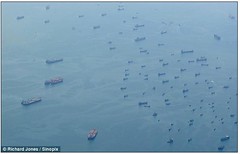
As some in this country want to start a trade war - there is an ominous gathering in Asia ... and it ain't what you think.
Here, on a sleepy stretch of shoreline at the far end of Asia, is surely the biggest and most secretive gathering of ships in maritime history. Their numbers are equivalent to the entire British and American navies combined; their tonnage is far greater. Container ships, bulk carriers, oil tankers - all should be steaming fully laden between China, Britain, Europe and the US, stocking camera shops, PC Worlds and Argos depots ahead of the retail pandemonium of 2009. But their water has been stolen.I wonder what the good folks at gCaptain and/or Fred think of this?
They are a powerful and tangible representation of the hurricanes that have been wrought by the global economic crisis; an iron curtain drawn along the coastline of the southern edge of Malaysia's rural Johor state, 50 miles east of Singapore harbour.
Some experts believe the ratio of container ships sitting idle could rise to 25 per cent within two years in an extraordinary downturn that shipping giant Maersk has called a 'crisis of historic dimensions'. Last month the company reported its first half-year loss in its 105-year history.
Martin Stopford, managing director of Clarksons, London's biggest ship broker, says container shipping has been hit particularly hard: 'In 2006 and 2007 trade was growing at 11 per cent. In 2008 it slowed down by 4.7 per cent. This year we think it might go down by as much as eight per cent. If it costs £7,000 a day to put the ship to sea and if you only get £6,000 a day, than you have got a decision to make.
You may wish to know this because, if ever you had an irrational desire to charter one, now would be the time. This time last year, an Aframax tanker capable of carrying 80,000 tons of cargo would cost £31,000 a day ($50,000). Now it is about £3,400 ($5,500).
...
'The prospects for shipyards are bleak, particularly for the South Koreans, where they have a high proportion of foreign orders. Whole communities in places like Mokpo and Ulsan are involved in shipbuilding and there is a lot of sub-contracting to local companies,' Wallis says.
'So far the shipyards are continuing to work, but the problems will start to emerge next year and certainly in 2011, because that is when the current orders will have been delivered. There have hardly been any new orders in the past year. In 2011, the shipyards will simply run out of ships to build.'
Christopher Palsson, a senior consultant at London-based Lloyd's Register-Fairplay Research, believes the situation will worsen before it gets better.
No comments:
Post a Comment